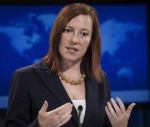Exciting news! World War III is busting out all over – in the Middle East, Eastern Europe, and East Asia! For perplexed souls wondering how the earth got itself into such a sorry mess, here’s a political lexicon to help make sense of it all.
Terrorism: Extreme violence directed at U.S. interests.
Shock and Awe: Extreme violence directed at people the U.S. doesn’t like. e.g. Saddam Hussein.
Freedom Fighter: Anyone who practices extreme violence in an authorized manner, e.g. Osama bin Laden when he was fighting the Soviets in Afghanistan.
Terrorist: Anyone who practices extreme violence in an unauthorized manner, e.g. Osama bin Laden after he turned against the United States in 1998.
Islam: Noble religious tradition dating from the seventh century.
Islamism: Noble religious tradition taken to political extremes.
Jihad: Noble religious tradition taken to violent extremes. Laudable when aligned with U.S. interests as in Afghanistan in the 1980s. (See “freedom fighter.”) Reprehensible when not.
Sectarian: Any Shiite who behaves in a way prejudicial to Sunni interests, e.g. Iraqi prime minister Nuri al-Maliki.
Non-sectarian: Any Sunni who behaves in a way prejudicial to Shiite interests, e.g. King Abdullah of Saudi Arabia.
Extremist: Any Muslim who turns Islam into a source of hatred and fanaticism, e.g. Al Qaeda, Al-Nusra, Islamic State of Iraq and al-Sham (ISIS).
Moderate: Any citizen of a pro-U.S. Persian Gulf state even if he funds Al Qaeda, Al-Nusra, or ISIS.
Axis of Evil: Formerly Iran, Iraq, and North Korea, but since reconfigured now that Baghdad is in the U.S. fold and Iran may be needed to beat back ISIS. Putin’s Russia and Nicolas Maduro’s Venezuela may be added at some future date.
Bush Doctrine (“If you harbor a terrorist, you’re equally as guilty as the terrorists”): Formerly applicable to Syria, Iran, and Afghanistan under the Taliban, but never to Saudi Arabia even though Hillary Clinton admitted back when she was secretary of state that Saudis “constitute the most significant source of funding to Sunni terrorist groups worldwide.” Kuwait and Qatar are also exempt, as are Turkey and Jordan even though they have allowed terrorists to use their territory to stage attacks inside Syria. Applicability to Iran currently uncertain.
Democracy: Essential goal for all Middle Eastern states except certain Sunni oil producers in the Persian Gulf.
Repression: What Bashar al-Assad did in crushing popular protests in 2011.
Restoring Law and Order: What U.S. ally Bahrain did in crushing popular protests in 2011.
Propaganda: Information, communications, etc. contrary to U.S. interests.
Crude propaganda: Russian information, communications, etc. contrary to U.S. interests.
Caricatures in the Russian media’s fun-house mirror: Moscow’s cockeyed view of world events in The New York Times’ offhand description. (See Andrew E. Kramer, “Front and Center in Ukraine Race, a Leader of the Far Right,” Mar. 11, 2014.)
Caricatures in the American media’s fun-house mirror: Contradiction in terms since U.S. media are always rigorously objective.
World War II: Great military conflict won by Tom Hanks at D-Day.
Battle of Stalingrad: Great military conflict that can be safely ignored since everyone knows the combatants were morally indistinguishable. For an extended disquisition on Soviet-Nazi moral equivalency, see Timothy Snyder, Bloodlands: Europe Between Hitler and Stalin, 2010.
Genocide: Greatest conceivable political crime unless it involves the Syrian Alawites, in which case it is simply part of the price of ridding Syria of Assad family tyranny. (Sorry about that.)
Safe Haven: Something that John Kerry says that ISIS must absolutely be denied, except in Syria where the U.S. has been providing it for years by sponsoring sectarian warfare against the Assad regime.
Political debate: A process that lesser countries engage in but never the U.S. because Americans know what’s right without even having to think about it.
Indispensable nation: America due to its unerring moral compass.
American exceptionalism: The doctrine that the aforementioned moral compass exempts the U.S. from ordinary legal standards and allows it to assume the role of global dictator.
Energy conservation: Something for dispensable nations to worry about.
Bonus question: How do you tell a good neo-Nazi from a bad neo-Nazi?
Answer: A bad neo-Nazi is someone like France’s Jean-Marie Le Pen, who taunts Jews and makes light of the Holocaust. An even worse neo-Nazi is one who gains real political power, e.g. the Jobbik Party following its strong showing in the Hungarian elections last January or Jörg Haider when his far-right Austrian Freedom Party became part of the ruling coalition in the year 2000. But a neo-Nazi who becomes part of a pro-U.S. government in an important swing state is another story. This is why Svoboda Party leader Oleh Tyahnybok, who once railed against “the Moscow-Jewish mafia” ruling the Ukraine, was granted a friendly photo op with assistant U.S. secretary of state Victoria Nuland in February. Anti-Semitism is very bad unless it’s on the side of the U.S., in which case it’s no longer anti-Semitism at all.



